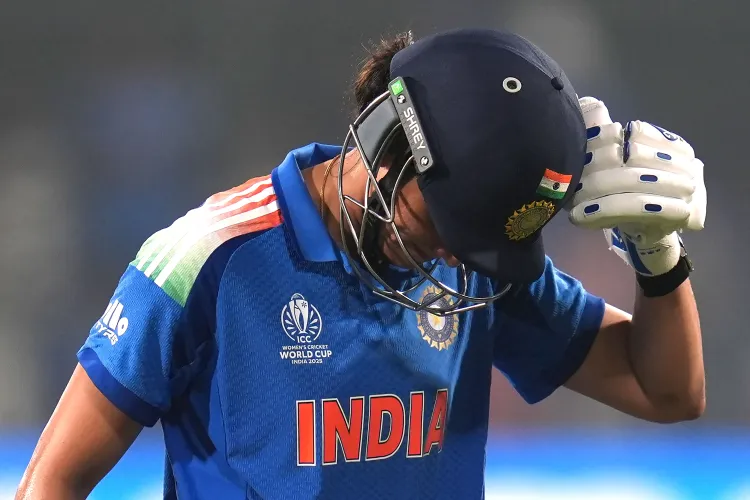Did Smriti Mandhana Take Too Much Blame for India's Loss?

Synopsis
Key Takeaways
- Smriti Mandhana accepts responsibility for the loss.
- India struggles with shot selection under pressure.
- Team morale impacts performance significantly.
- Upcoming matches are crucial for semi-final qualification.
- Patience and experience are vital in high-stakes cricket.
Indore, Oct 20 (NationPress) When Smriti Mandhana entered the press conference room following India’s narrow four-run loss to England, marking their third defeat in the 2025 Women’s ODI World Cup, the atmosphere was undeniably heavy as her emotional turmoil became evident.
Just moments earlier, Smriti had been visibly shaken in the dugout after India faltered in yet another chase, succumbing by four runs. Now, as she stepped forward to discuss a match that India should have easily won, her voice reflected her profound disappointment, reinforcing the somber mood surrounding the Indian team.
Her eyes revealed deep sorrow, her brows slightly furrowed, and her serious expression indicated the burden of introspection she felt. Known for holding herself to high standards, the pressure of losing a match when victory seemed within reach was clearly weighing on her.
After overcoming a shaky start to score 88 runs, Smriti appeared composed and patient as her classic late cuts and elegant glides showcased her skill. However, as boundaries ceased and a left hamstring cramp struck, her frustration became evident.
During the 42nd over, with India needing 55 runs off 53 balls for a crucial win, Smriti chose to engage with Linsey Smith, who bowled a delivery that drifted away from her. Unfortunately, Smriti failed to connect properly and was caught at long-off.
As England celebrated, the 16,300 fans at Holkar Stadium fell silent, watching Smriti walk back with her head bowed in despair, marking the end of her 125-run partnership with Harmanpreet. It was clear why Smriti accepted responsibility for India’s painful defeat.
“Looking at everyone's shot selections during that phase - we could have made better choices. It started with me, so I will take responsibility for our shot selection. We only needed six runs per over. Perhaps we should have prolonged the game. I’ll own this because the collapse initiated with my dismissal,” she stated.
After her exit, she was confident India would clinch the win. “I believed I could take her on. I aimed to hit over covers, but I mistimed the shot. Again, as I mentioned, the shot selection wasn’t ideal at that moment.”
“I needed to exercise more patience, as I constantly reminded myself during the innings to stay calm and avoid aerial shots. Unfortunately, emotions got the better of me this time, which is detrimental in cricket. When I left the field, I was quite sure we would secure the win, but in cricket, it’s crucial not to get ahead of oneself,” she added.
Despite Deepti Sharma scoring a fifty and some late runs from Amanjot Kaur and Sneh Rana, India ultimately fell short, marking the third consecutive occasion they stumbled in the final moments of this World Cup.
After Smriti’s dismissal, England’s decision to reinstate Linsey and Sophie was perfectly timed. With three fielders positioned deep on the leg side, the left-arm spinners restricted the run flow, and India struggled to break free from England’s tight grip.
“Richa has been performing well for us, but I wouldn’t say it relied solely on her. We required six runs per over - not nine, making the finish achievable,” she explained.
“We’ve seen Aman perform in the WPL, and Sneh has been exceptional in the last few matches. I wouldn’t say it was solely dependent on one player. We all share accountability for not doing better in the last six overs,” Smriti remarked.
After India’s loss to Australia in Visakhapatnam, head coach Amol Muzumdar emphasized that ‘finishing well in the game is more crucial than starting strong’. His words resonated on Sunday as India failed to secure victory, extending their losing streak and jeopardizing their semi-final aspirations.
“If you observe their innings, they didn’t finish strongly either. In the last five overs, they also lost five wickets. The final five or six overs are the toughest to navigate. Achieving seven runs per over is no easy feat,” she pointed out.
“In the first few matches, we did finish strongly. Against South Africa, we scored nearly 90 runs in the last 10 overs, demonstrating our capability,” she noted.
“Ultimately, it’s about how we experienced players can step up during challenging situations and guide the younger players, as we have many newcomers in the lineup. It’s our responsibility to lead and manage those tough phases,” Smriti elaborated.
Smriti has always been known for her self-critical nature, and when asked to reflect on her innings, the pain in her voice was evident. “During my innings, I felt the new ball was doing a bit, particularly with Lauren Bell, and there was one delivery that had a bit of extra nip.”
“But regarding my innings, if you lose, it diminishes its significance. It’s irrelevant if you perform well; I needed to exhibit more patience than I have in the past few months. But how one should bat for the team was my thought process until that ball I played. Hence, I prefer not to discuss my innings as it bears no weight since we lost,” she concluded.
The path for India is straightforward - they must win both their upcoming matches against New Zealand and Bangladesh in Navi Mumbai to keep their hopes of reaching the semi-finals alive.
“In cricket, nothing comes easily. The next match is essentially a virtual quarter-final for securing a top-four position. However, we don’t play cricket for easy days. We’ll all take this challenge head-on,” she stated.
“We recognize where we could have improved and where we faltered. In sports, there are good days and bad days. It’s about how we handle those tough days and strive to excel against New Zealand,” Smriti concluded, her voice and demeanor encapsulating the narrative of a night that slipped away from India, leaving their campaign precariously hanging in the balance.
–IANS
nr/bc










